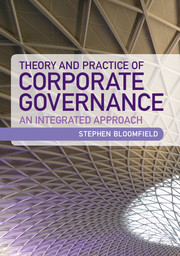Book contents
- Frontmatter
- Contents
- List of Figures and Tables
- Introduction
- Part 1 The Discipline of Governance
- Part 2 The Relationship between Law and Governance
- Part 3 Governance and the Listed Company
- Chapter 6 The development of governance – the Governance Codes
- Chapter 7 The 2007–8 financial crisis: the failure of systemic governance
- Chapter 8 Systemic governance: the Turner Review, the Walker Review and the Vickers Commission
- Part 4 Governance and Regulation
- Part 5 Counter-governance: Failures of governance and corporate failure
- Bibliography
- Index
- References
Chapter 8 - Systemic governance: the Turner Review, the Walker Review and the Vickers Commission
from Part 3 - Governance and the Listed Company
Published online by Cambridge University Press: 05 March 2013
- Frontmatter
- Contents
- List of Figures and Tables
- Introduction
- Part 1 The Discipline of Governance
- Part 2 The Relationship between Law and Governance
- Part 3 Governance and the Listed Company
- Chapter 6 The development of governance – the Governance Codes
- Chapter 7 The 2007–8 financial crisis: the failure of systemic governance
- Chapter 8 Systemic governance: the Turner Review, the Walker Review and the Vickers Commission
- Part 4 Governance and Regulation
- Part 5 Counter-governance: Failures of governance and corporate failure
- Bibliography
- Index
- References
Summary
This chapter will examine:
the scrutiny of corporate governance after the financial collapse through the Turner and Walker Reviews;
what the Reviews revealed about corporate governance in the financial sector prior to the collapse;
whether the conclusions the reviews arrived at were borne out by events.
Following the financial collapse of 2007–8 and the huge public sums invested in shoring up the financial system – and especially the banks – there was, unsurprisingly, a clamour to find out what had gone wrong. The British Government in particular had said that they would ‘do anything it takes’ during the crisis to maintain the structure of the financial system and prevent any UK bank collapsing. In an effort to re-assure the tax-paying, riding-to-the-rescue electorate who now found themselves in possession (if not ownership) of all but two of the UK’s major banks (the exceptions being Barclays and HSBC, both of which still accepted money to bolster their resources through the electronic ‘quantitative easing’ scheme), at least five separate reviews were set in train: a review of the activities of the FSA by its chairman Lord Turner; a review of the response of the Treasury (which reported in March 2012); the Walker Review; the Future of Banking Commission established by a consumer group; and the Independent Banking Commission (the Vickers Commission). Alone of the major policy-makers no review was carried out by the Bank of England.
- Type
- Chapter
- Information
- Theory and Practice of Corporate GovernanceAn Integrated Approach, pp. 172 - 198Publisher: Cambridge University PressPrint publication year: 2013



